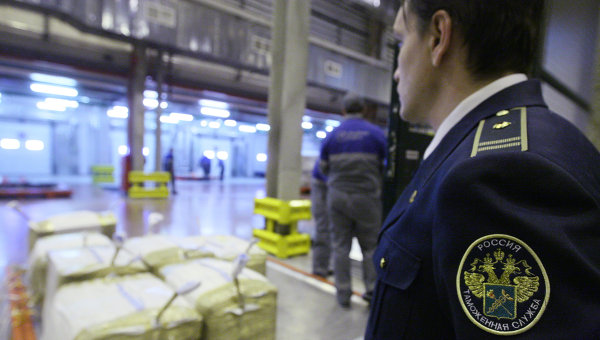
Ukraine Drifting Away From Customs Union With Russia
Ukraine Drifting Away From Customs Union With Russia
Ukraine has sent Russia a clear signal that it is unconvinced it would benefit from membership in the Russian-dominated customs union more than from free trade with the European Union. The Ukrainian parliament instructed the government to prioritize the association and free trade talks with the EU over relations with the Customs Union one day after Russian President Dmitry Medvedev urged Ukraine to choose between Russia and the EU. This was a rare occasion when the pro-government majority and the opposition in Ukraine’s parliament shared the same point of view. It is becoming increasingly difficult for Russia to draw Ukraine back into its orbit.
Medvedev, during his press conference on May 18, made it clear that if Kyiv hoped to play on the differences between him and Prime Minister Vladimir Putin ahead of next year’s presidential election in Russia (EDM, May 4), it would be a wasted effort. There are apparently no differences as far as Ukraine is concerned. Like Putin, Medvedev believes it would be difficult for Ukraine to cooperate with the Customs Union members of Russia, Kazakhstan and Belarus if the country chose “the European vector.” “Be either here or there. One cannot sit on two stools, one must make a choice,” said Medvedev (Interfax, May 18).
On May 19, Ukraine’s parliament, which is dominated by the allies of President Viktor Yanukovych viewed by many as pro-Russian, showed Medvedev that a pro-European choice was made. It passed political recommendations to the government “on the current state and prospects of development of economic relations with the EU and the customs union,” which states that the completion of the political association and free trade talks with the EU is the short-term top priority. As for the Customs Union, the document only advises the government to develop cooperation with the organization and its member states according to World Trade Organization (WTO) principles (www.rada.gov.ua, May 19). While Ukraine is a WTO member, none of the Customs Union members have joined it yet, complicating interactions with Russia, Belarus and Kazakhstan.
Of the 385 deputies registered in the session hall, 289 voted in favor of the recommendations. These included representatives from all of the caucuses except the Communist Party. Moreover, none of the communists, viewed as the most pro-Russian party in parliament, actually voted against the resolution. They simply did not vote. This showed that Ukraine’s political elite, like the majority of the population, is rather pro-European. Furthermore, the richest businessmen in Ukraine are either people’s deputies themselves, or their delegated legislative representatives do not see many advantages from a close economic union with Russia. This is not surprising. Gas price discounts have thus far been the only carrot offered by Russia, but neither Medvedev nor Putin have been convincing enough (EDM, April 22).
Commenting on the vote, Ukrainian Deputy Speaker Mykola Tomenko, who belongs to the opposition caucus of former Prime Minister Yulia Tymoshenko, said all the i’s were now dotted in the discussion of Customs Union membership (UNIAN, May 19). People’s deputy Arseny Yatsenyuk, a former parliamentary speaker, former foreign minister and moderate oppositionist, said the vote showed that Ukraine would not join the Customs Union. He added that in the future any Ukrainian official who dared to speak about joining the Customs Union would effectively break the law (www.frontzmin.org, May 19). On May 20, U.S. Vice President, Joseph Biden, telephoned Yanukovych to express U.S. support for Ukraine’s plans to complete the association talks with the EU. Biden said this was important for building a bridge between Russia and Europe (www.president.gov.ua, May 20).
A free trade agreement with the EU should be part of a broader political association agreement. Kyiv hopes to form free trade areas with both the EU and Russia including the CIS, but without joining the Customs Union. Kyiv wants to achieve both aims this year, though each target has uncertain prospects. The free trade talks with the EU have been difficult both because the EU is reluctant to open its market to cheap Ukrainian exports and because many in Brussels suspect that Ukraine would eventually prefer the Customs Union with Russia. At the same time, free trade with the CIS may never materialize because Russia does not want Ukraine to simultaneously integrate into the EU.
Kyiv hoped to sign a free trade accord in the CIS framework at the meeting of CIS prime ministers in Minsk on May 19, but this did not happen. Citing its sources in the Ukrainian government, Kommersant-Ukraine business daily reported on May 23, that Uzbekistan and Russia derailed the talks. In particular, Uzbekistan reportedly rejected a provision on the regulation of disputes over non-tariff barriers and did not agree to any compromises proposed by Ukraine. Kyiv representatives in the talks said Russia was behind Uzbekistan’s demarche. “Unexpectedly” for Kyiv, Moscow insisted that consensus should be reached on all provisions of the accord, the newspaper said. Kommersant’s sources explained this as stemming from Russia’s disappointment with Ukraine’s decision to prefer free trade talks with the EU over the Customs Union.


